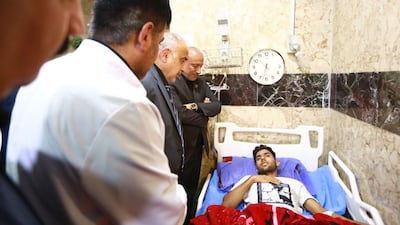Iraqi Prime Minister Adel Abdul Mahdi rejected on Tuesday the resignation of the country’s health minister who cited blackmail and corruption in his notice letter.
Ala Al Alwan, former regional director for the World Health Organisation, said he experienced “excessive pressures” that hindered the progress of his work in the ministry.
“I have received support from officials who back my decision in rejecting your resignation,” the premier told Mr Al Alwan in a letter.
The premier granted Mr Al Alwan an open period of leave to reassess his decision.
Lack of good governance has been central to Iraq’s problems. Transparency International ranks Iraq 168 out of 180 countries on its Corruption Perception Index.
Mr Al Alwan is one of the five technocrats in the premier's cabinet, including Minister of Electricity Louay Al Khatib and Oil Minister Thamer Al Ghadhban, who are not linked to any political parties.
This was the minister's second attempt to resign from the post. He handed his notice to the premier in March.
But he was convinced by Mr Abdul Mahdi to stay on.
Officials in Baghdad say that Mr Al Alwan was left with no other choice but to hand in his notice due to the high level of corruption in government.
Hamid Al Mutlaq, a former member of parliament, told The National that Mr Al Awan knew that corruption was evident in the ministry when taking up the post.
“He was aware that corruption existed in the government. Yet, he wanted to use his abilities to provide good health services to the public and to improve the country’s health sector,” Mr Al Mutlaq said.
Mr Al Alwan took on the challenge but was faced with “high level corruption” that made it almost impossible for him to do his job.
Corruption became a dominating influence in the health ministry, Mr Al Mutlaq said, adding that entire budgets allocated to building hospitals had been lost, leaving nothing behind for actual construction.
Mr Al Alwan resorted to handing in his notice to preserve his reputation, Hassen Al Kazzaz, the former director of public health at the ministry of health, told The National.
“People will ask about his achievements down the line especially after he assumed the post. So he found it necessary to resign,” Mr Al Kazzaz said.
The resignation is a sign to the fact that the health sector is run by the “mafia”. Fighting corruption can threaten lives, families and reputation, he said.
“Very simply they have ways of smearing reputations of people who go against their corruption,” he said.
Mr Al Alwan’s resignation is seen as another setback for Mr Abdul Mahdi as he struggles to form a government nearly 11 months since he was appointed.
The cabinet will be short of two ministers if Mr Al Alwan refuses to assume his post.
Shaima Al Hayali, appointed to the post of education minister last December, quit the post following accusations of links to ISIS.
The delay in forming a government increases the country’s risks of further unrest in Iraq as it struggles to recover and rebuild after three years of war against ISIS.

